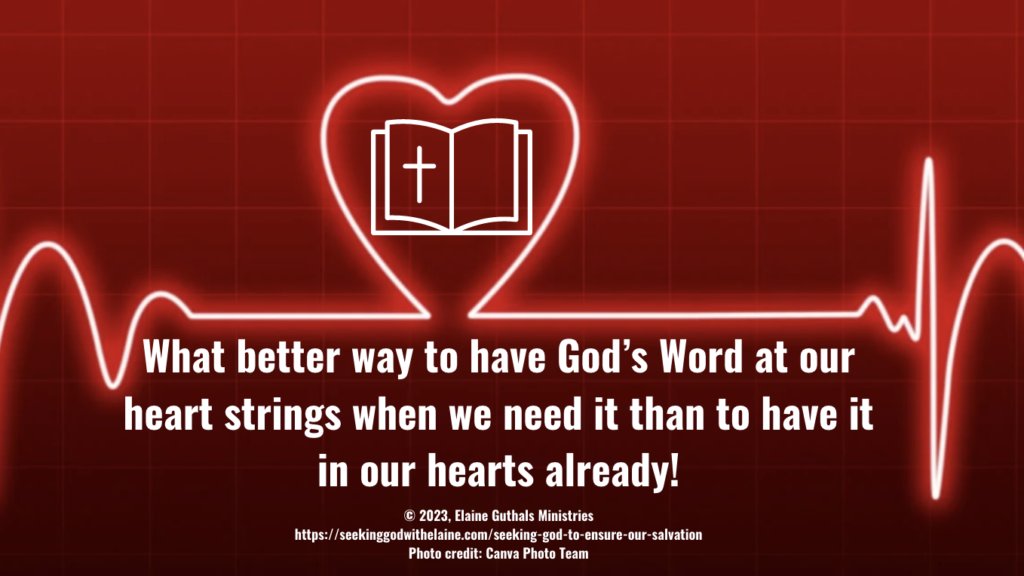We have to continue to seek God to ensure our salvation in Him. This devotional reading looks at meditating on and memorizing God’s Word while praying and submitting to Him.
Nuggets
- We have to meditate on God’s Word to apply what is heard, read, and learned to our lives.
- We must memorize God’s Word so we can truly use it as a guide in every circumstance.
- We must pray to God before and after we have heard, read, studied, meditated, and memorized God’s Word so we can submit our lives to Him.
- We need to submit to God by trusting Him to know what is best for us.

In the last devotion, we started looking at the part of Beveridge’s sermon entitled Uses. We are also looking at them to complete our Habitual Holiness for Heart and Life theme.
Beveridge said that we should tend to the means which brings our souls to Christ. The first three items in the last devotion was how we seek God. We are going to look at the last three items in this devotion and look at committing our souls to God’s care.
Let's Put It into Context
To read devotions in the Habitual Holiness of Heart and Life theme, click the button below.
Here is a running list of nuggets for the theme.
Devotions in the The Surity of Our Salvation study
Here is a running list of nuggets for the study.
The foundation of this study is Beveridge’s sermon The Believer’s Safety
Resource
The purple headings are Beveridge’s words.
Carefully Attend Those Means which God Gives to Bring Your Souls to Christ, cont.
Meditating
“Keep this Book of the Law always on your lips; meditate on it day and night, so that you may be careful to do everything written in it. Then you will be prosperous and successful” (Josh. 1: 8 NIV)
We have to meditate on God’s Word to apply what is heard, read, and learned to our lives.
Hearing the Word depends on someone else’s schedule. We set aside our time for our daily devotion, but is that really reading God’s Word or someone’s application of a verse? That is usually a scheduled time – it can be a short one at that.
Meditation is different. Meditation is consciously and systematically thinking of a chosen subject.
Those thoughts are very important thoughts. They guide what our hearts become. They are the foundations of our decisions.
God wants us to carefully consider what He is teaching us as we navigate the Sanctification Road. If we hear God’s Word but don’t evaluate it against what we believe, we may be led down a false path.
If we read God’s Word but don’t understand it and don’t study it further – and don’t apply it to us – we aren’t going to make an informed opinion on what it is telling us.
Meditation is the contemplation of all God is telling us — through the Holy Spirit, His Word, others — however He is talking to us. It is an examination of His holiness so we can compare it to ourselves and fix what isn’t right.
We have to think about what we believe and apply what He is telling us.
The time we spend meditating is really the first step to changing to live our lives more in line with that to which God is calling us.
Isaiah told us how important it is to meditate on God. “You keep him in perfect peace whose mind is stayed on you, because he trusts in you” (Isa. 26: 3 ESV).
Memorizing
“I have stored up your word in my heart, that I might not sin against you” (Ps. 119: 11 ESV)
We must memorize God’s Word so we can truly use it as a guide in every circumstance.
We talk about burying ourselves in God’s Word. What we are really doing is getting it down to the heart level.
Memorizing makes God’s Word a part of us. Getting it into our hearts allows it to change us.
What better way to have God’s Word at our heart strings when we need it than to have it in our hearts already!

Praying
“My mouth shall speak wisdom; the meditation of my heart shall be understanding” (Ps. 49: 3 ESV)
We must pray to God after we have heard, read, studied, meditated, and memorized God’s Word so we can submit our lives to Him.
All through seeking God, we must be praying to Him for guidance, understanding, and praise.
We can’t seek God on our own. He must guide us through it the entire way.
God calls us to salvation – really, He is calling us to Himself. Our response is through prayer.
Prayer is a two-way communication with God in which we pour out our soul to Him.
We have to know we need God before we can come before His presence.

We only have access to God when we believe. We can only believe if we have been told/read/decided.
Our prayers have to come out of hearing, reading, studying, meditating on, and memorizing God’s Word.
Commit Your Souls to Christ’s Care
“Therefore let those who suffer according to God’s will entrust their souls to a faithful Creator while doing good.” (I Pet. 4: 19 ESV)
We need to submit to God by trusting Him to know what is best for us.
Entrusting our souls to the Creator. That kind of jumps out at us when we read that verse, doesn’t it?
That is in the middle of the verse. Let’s start at the beginning as we usually do.
Those who suffer would be everyone. I remember Pastor Tim saying that we are either in a trial, coming out of a trial, or fixing to start a trial.
True, sometimes we suffer more in one trial than we do in another one. But a trial is anything from an annoyance to a hardship. It can be a full out battle.
We have to remember two things. We are not alone in the battle. God is with us, fighting for us.
Also, God allows the trials to happen for a couple of reasons. He uses those to grow us closer to Him helps us see the positive in the turmoil.
The second is that we are just human. Sibbes put it this way. He wrote, “Because they [disciples] live among those that they cannot but suffer from, wheresoever they live. They must suffer also in regard of themselves; for the best of us all have many lusts to be subdued, and a great deal of corruption to be purged out, before we can come to heaven, that holy place into which no unclean thing can enter.”
Resource
Still, the trials are hard. Satan isn’t going to let up on us. He is going to hound us until we think we are going to crack.
That is when we really entrust God with our souls. Yes, entrusting Him is an everyday occurrence.
But when the going gets really rough, that is when we especially have to put our faith and trust in Him.
It is going to take commitment. Our very first series this year was different aspects involved in commitment.
- Consistency
- Support
- Communication
- Agreement
- Integrity
- Trust
- Engagement
- Responsibility
- Liability
- Concept
To read a devotion from the Committing to Grow Our Habits study series, click on the button below.
It is going to take submission. We need to put everything in God’s hands and let Him call the shots. He knows the outcome where we don’t.
How we react to suffering is important. We shouldn’t look for it or try to avoid it. When it comes, we have to endure it with grace.
We get this grace from a faithful Creator. We can rely on His character and love.
Smyth described God’s character as being a “… true, holy, righteous, merciful, supremely moral character.” These are just some of His attributes.
To read a devotion in the Finding Our Center series, click on the button below.
God doesn’t create us and then just cut us loose to fend on our own. He never leaves us.

If God left us on our own, we wouldn’t be able to fulfill the purpose that He has for us — and He does have a purpose. “For by grace you have been saved through faith. And this is not your own doing; it is the gift of God, not a result of works, so that no one may boast” (Eph. 2: 10 ESV).
God’s faithfulness to us includes designing the Plan of Salvation so that we can be restored to fellowship with Him. He didn’t have to — especially a Plan so costly — but He did.

Making the Connections
I’ve said this before.
So many times, we want a get-devoted-quick scheme. We don’t want to read devotions over two minutes at the screaming outside. We want a step-by-step plan to get our devotional life on track – preferably not involving the six steps listed here.
It will always come down to we need to have more contact with God’s Word. This means both hearing and reading. But it can’t be a cursory glance. We have to study what we are hearing to make sure it is following God’s Word. We have to study what we are reading to make sure we understand what it is saying – not what we want it to say.
Then we have to hold our lives up against what God is telling us. Are we following His Will?
Oh, I know. Memorizing is not my strong suit unless it is put to music. I will struggle with this one.
Overarching all of that should be prayer. We have to communicate with God. We have to give Him the honor and praise due Him.
How Do We Apply This?
The ABCDs of Salvation
If you have not become a believer in Christ, please read through the
Plan of Salvation and prayerfully consider what God is asking you to do.
A – admit our sins
B – believe His Son Jesus is our Redeemer
C – confess God as Sovereign Lord
D – demonstrate that commitment by making any changes needed in our lives to live the way in which God has called us
The Disciple’s Job Description
- Find a read the Bible daily plan.
- Find good commentaries and other support materials.
- Find on-line courses, such as the Torah class, to learn more.
- Get God’s Word to our heart level – memorize, paraphrase, find examples from our own lives – so we can use it in times of trials.
- Pray to God unceasingly.
- Commit to God, especially through our engagement.
Father God. We seek You because we are nothing without You. Through You, we can do all things that is Your Will. Help us to seek You in all we say and do. Amen.
What do you think?
Leave me a comment below (about this or anything else) or head over to my Facebook group for some interactive discussion.
If you don’t understand something and would like further clarification, please contact me.
If you have not signed up for the email providing the link to the devotions and the newsletter, do so below.
If God has used this devotion to speak with you, consider sharing it on social media.